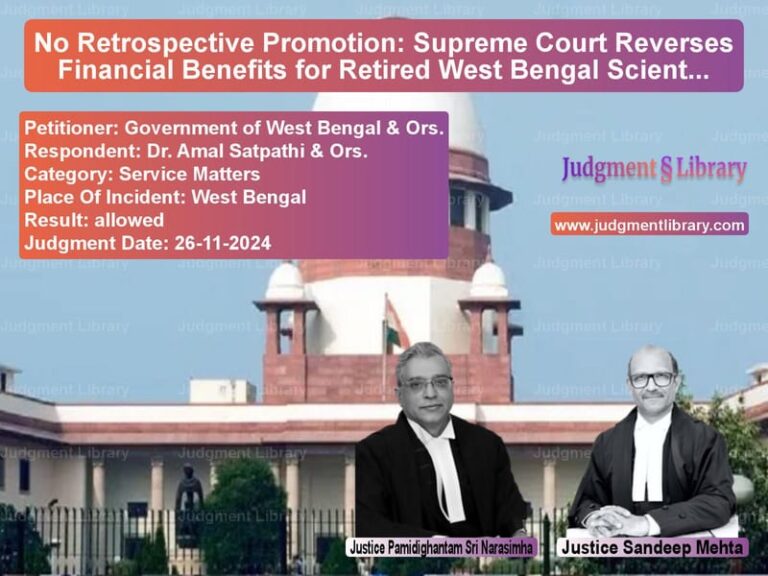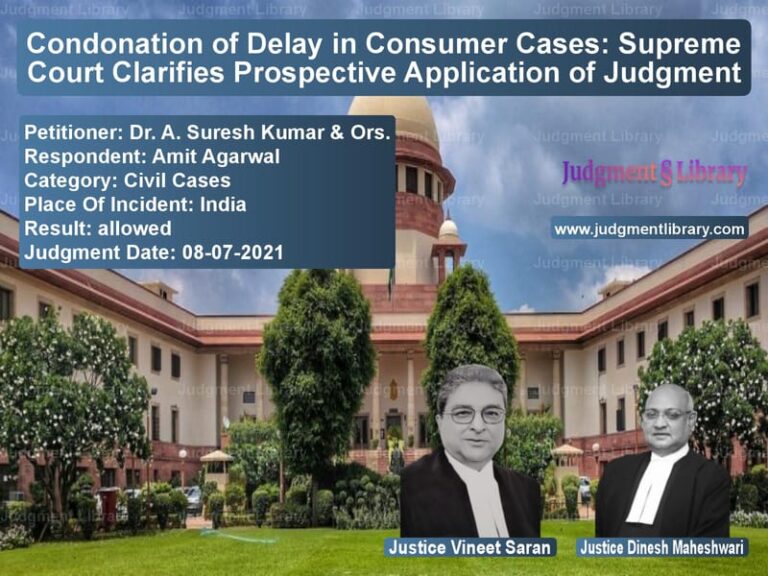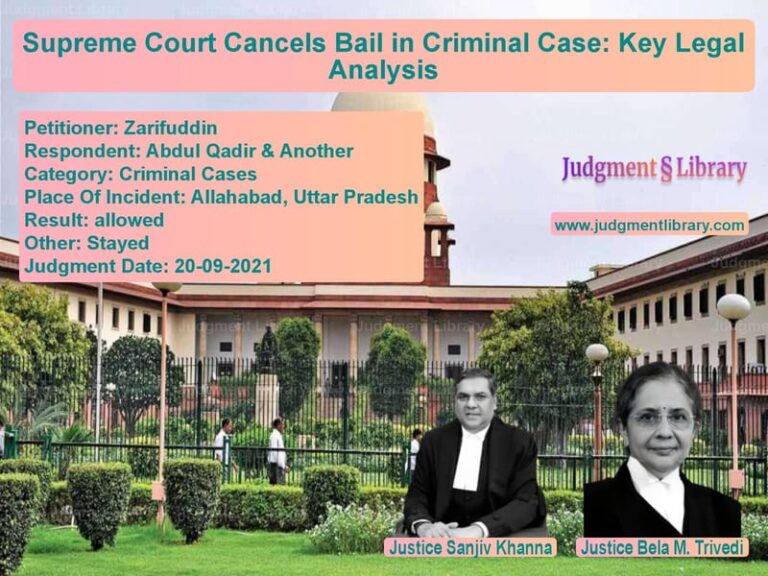Judicial Officer’s Forced Resignation: Supreme Court Orders Reinstatement After Arbitrary Transfer
The case of Ms. X vs. Registrar General, High Court of Madhya Pradesh & Another is a landmark judgment concerning the rights of judicial officers against arbitrary transfers and forced resignations. The Supreme Court examined whether the petitioner’s resignation was truly voluntary or a result of coercion due to an unfair transfer order. The Court ruled in favor of the petitioner, setting a precedent for protecting judicial independence from administrative arbitrariness.
Background of the Case
The petitioner, an Additional District Judge (ADJ) in Madhya Pradesh, had served the judiciary with distinction for many years. In July 2014, she was transferred from Gwalior to Sidhi through an order issued by the Madhya Pradesh High Court. The transfer order was passed in the middle of the judicial year, which was unusual and contrary to the established Transfer Policy of the High Court.
The petitioner filed multiple representations citing her daughter’s ongoing education as a valid ground for reconsideration of the transfer. Under Clause 9(a) of the Transfer Policy, judicial officers could seek deferment of transfer based on children’s education. However, her representations were dismissed within a few days without proper evaluation.
Feeling cornered by the sudden transfer and the lack of a fair hearing, the petitioner submitted her resignation on July 15, 2014. The resignation was accepted within just two days, on July 17, 2014, without any effort to counsel the officer or investigate the circumstances leading to her resignation.
Legal Issues Raised
- Whether the petitioner’s resignation was voluntary or forced due to arbitrary administrative action.
- Whether the transfer violated the established judicial service rules and transfer policy.
- Whether the High Court, acting as an administrative body, failed to act fairly and justly.
- Whether the petitioner was entitled to reinstatement and other reliefs.
Petitioner’s Arguments
The petitioner challenged her resignation and argued that:
- The transfer was arbitrary, mid-term, and unjustified, violating her rights under Articles 14 and 16 of the Constitution.
- The Transfer Policy specifically provided relaxation for judicial officers whose children were in school, but her request was rejected without proper application of mind.
- She was compelled to resign as she was left with no viable options due to administrative pressure.
- The resignation was accepted in undue haste, which violated principles of fairness.
- The judiciary, as an institution, must protect judicial officers from undue administrative interference, ensuring fairness in transfers and postings.
Respondents’ Arguments
The respondents, including the High Court of Madhya Pradesh, argued:
- The transfer was part of routine administrative decisions made in judicial service and was not meant to punish or coerce the petitioner.
- The petitioner had voluntarily resigned, and there was no evidence to suggest coercion or force.
- The resignation was processed in the normal course, and there was no procedural lapse.
- Reinstating the petitioner after resignation would set a wrong precedent and disturb administrative discipline.
Supreme Court’s Analysis
The Supreme Court examined the facts and made crucial observations regarding the arbitrary nature of the transfer and the circumstances leading to the resignation. The Court noted:
“A judicial officer’s service conditions must be governed by principles of fairness and transparency. Transfers cannot be used as a tool to pressurize officers into submission.”
The Court found that the petitioner’s transfer was indeed unusual because:
- It was mid-term, disrupting her family life without valid justification.
- Her representations for deferment were rejected in an arbitrary manner.
- Her resignation was processed unusually fast, suggesting an intention to remove her from service without due process.
On the issue of resignation, the Court held:
“For a resignation to be valid, it must be tendered freely and voluntarily. In the present case, the surrounding circumstances indicate that the petitioner was left with no real choice, making her resignation involuntary.”
Final Judgment
The Supreme Court ruled in favor of the petitioner and quashed the acceptance of her resignation. The Court ordered:
- The petitioner shall be reinstated in service with continuity of employment.
- No back wages shall be awarded, but her seniority and benefits shall remain intact.
- The High Court administration must review its transfer policy to ensure fair implementation.
- The judiciary must develop safeguards against forced resignations due to unfair administrative actions.
Implications of the Judgment
The ruling has major implications for judicial service protections:
- It strengthens safeguards against arbitrary transfers that unfairly affect judicial officers.
- It reinforces the principle that resignations given under coercion are not legally valid.
- It ensures greater transparency in the handling of judicial officers’ service conditions.
- It establishes that the judiciary must protect its officers from undue administrative pressure.
Conclusion
The Supreme Court’s ruling in Ms. X vs. Registrar General, High Court of Madhya Pradesh is a landmark decision that upholds fairness and transparency in judicial service matters. By reinstating the petitioner, the Court ensures that judicial officers are protected from forced resignations due to unfair transfers. This judgment serves as a critical precedent for judicial independence and administrative accountability.
Petitioner Name: Ms. X.Respondent Name: Registrar General, High Court of Madhya Pradesh and Another.Judgment By: Justice B.R. Gavai, Justice L. Nageswara Rao.Place Of Incident: Gwalior, Madhya Pradesh.Judgment Date: 10-02-2022.
Don’t miss out on the full details! Download the complete judgment in PDF format below and gain valuable insights instantly!
Download Judgment: ms.-x-vs-registrar-general,-h-supreme-court-of-india-judgment-dated-10-02-2022.pdf
Directly Download Judgment: Directly download this Judgment
See all petitions in Employment Disputes
See all petitions in Transfers Cases
See all petitions in Disciplinary Proceedings
See all petitions in Public Sector Employees
See all petitions in Judgment by B R Gavai
See all petitions in Judgment by L. Nageswara Rao
See all petitions in partially allowed
See all petitions in Quashed
See all petitions in supreme court of India judgments February 2022
See all petitions in 2022 judgments
See all posts in Service Matters Category
See all allowed petitions in Service Matters Category
See all Dismissed petitions in Service Matters Category
See all partially allowed petitions in Service Matters Category







